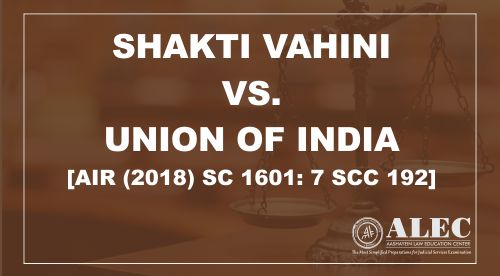SHAKTI VAHINI
vs.
UNION OF INDIA
[AIR (2018) SC 1601: 7 SCC 192]
BENCH- Dipak Mishra, A M Khanwilkar, D Y Chandrachud
BACKGROUD OF THE CASE-
The National Commission for Women authorised the petitioner, an organization to conduct a research on “Honour Killings in the areas of western U.P., Punjab and Haryana’. The organization asserted that there has been a significant increase in both the honour crimes as well as the fear among young people who are willing to marry each other but are unable to do so due to community strict rules. As a result of this oppression some of the victims are compelled to commit suicide while others suffer irreparable mental and emotional damage. Therefore a petition was filed under Art. 32 of the Indian Constitution to seek directions for the state governments as well as Central govt. to take necessary steps to prevent such honour related crimes. That the state govts. and central govt. shall be directed to submit a plan of action at the respective state levels and national level and that special cells should be constituted in each district making it easy for the couples to approach for their safety. That the writ of mandamus to be issued to the state govts. to initiate prosecutions in each and every case of honour killing and take measures to curb such an evil.
ISSUES INVOLVED
- Whether there exists a right of an individual to choose a partner of his/own choice?
- Whether allowing of honour killings by khap pachayats is legal?
You can also read the Blog by visiting [Blog]
For more information, visit [Aashayein Enquiry Section]
FINAL VERDICT
The honourable SC recognized the right of two consenting adults to choose each other as partners in marriage, to be a fundamental right under Arts. 19 and 21 of the Indian constitution. There is no requirement of consent of the family members, community or clan as a whole is not required. The right to marry is a part of right to life guaranteed under Art. 21 of the Indian Constitution.
Every individual has a right to marry a partner of his or her own choice. This right has been guaranteed by various international instruments as well like:
- Art. 16 of the Universal Declaration of Human Rights (UDHR),
- Art. 23 of the International Covenant on Civil and Political Rights, 1966.
- Art. 10 of the International Covenant of economic, social and cultural rights, 1966.
- Art. 12 of the European Convention on Human Rights.
The court further issued three types of measures namely preventive measures, punitive measures and remedial measures.
- The Preventive Measures include :
- Identification of districts and villages by state govts. where in the last five years instances of honour killings and assembly organised by khap panchyats have been reported.
- Responsibility lies on the police officer of giving information about such khap panchyat meetings regarding such marriages, to the senior officials like the DSP and ensuring the prevention of such meetings. If such meetings are to continue then the DSP should ensure his presence over there to see that violence or injustice should not happen.
- If the DSP on interacting with members of the khap panchayat is of the opinion that such a meeting cannot be prevented and it may cause harm to the lives of the couple or their family members then he shall submit a proposal to the DM/SDM or any other competent authority to invoke prohibition and arrest orders under Secs. 144 and 155of CrPC to take preventive steps.
- The Remedial Measures include :
- the married couples should be provided police protection and safe places to reside to ensure their safety.
- Lodging of FIR by the SHO/SP/DM on receiving information regarding unlawful assembly and criminal intimidation under Secs. 141, 143, 503 and 506 of the IPC.
- The Punitive measures include:
- Departmental action against the police officials and other authorities for failure or negligence to comply with the directions issued. This departmental action shall not extend beyond six months.
- A 24X7 helpline to be created for receiving complaints and rendering further assistance and protection to the couples seeking help.
- The final report of the same shall be submitted to the magistrate under Sec 173 of CrPC.
THE CONCLUSION
The court in its verdict referred to 242nd report submitted by the Law Commission of India namely, “Prevention of interference with the freedom of matrimonial alliances (in the name of honour and tradition): A suggested legal framework”. The report stated that the terms ‘honour killings’ and ‘honour crimes’ are used so conveniently just like a casual phrase to describe heinous incidents of violence committed towards young couple who intend to get married or actually get married as opposed to the wishes of their family members, community or the clan. It has been reported that as a part of punishment for the act of marriage such couples are harmed causing threat to their lives and limb and even get murdered.
The court held that the primary targets of such honour killings are mostly women because their of getting married on their own choice or establishing a premarital relationship is considered adulterous and likely to bring dishonour to the family’s or community’s reputation.
As far as the question as to the legality of the khap panchayats is concerned, these panchayats are no where defined in the constitution and neither are they elected as a part of the gram panchayat system mentioned under the constitution. They are not legally recognized and act as ‘de facto’ courts.
The court also mentioned that such assemblies, meetings pronouncing and ordering honour killings in the name of age old traditions are condemned not only in the country but also by international institutions, and are termed as serious human rights violation. Therefore penal action should be taken against such assemblies.

